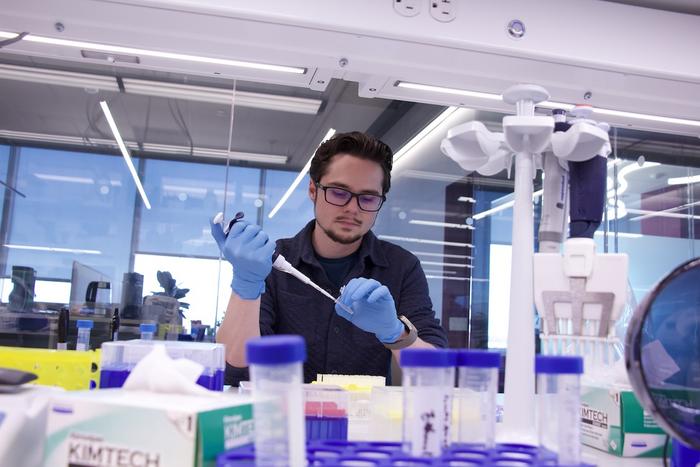
Recent advancements in the realm of genetic engineering have opened up exciting possibilities in the treatment of hereditary diseases. Researchers from the University of Pennsylvania School of Engineering and Applied Science are pioneering the development of a versatile genetic editing tool touted as a game changer in the field. This new innovation integrates gene editing with expression regulation capabilities, effectively enabling scientists to target and rectify multiple genetic disorders within the same cellular environment.
The team, led by Sherry Gao, a professor in chemical and biomolecular engineering, and a bioengineering expert, recently published their findings in the esteemed journal “Nature Communications.” Their breakthrough, named minimal versatile genetic perturbation technology, or mvGPT, represents a significant leap forward in genetic manipulation. This groundbreaking technology is not just about making cuts in the DNA; it also modulates gene activity by turning specific genes on or off. This multifaceted approach allows researchers to simultaneously perform a trio of tasks: editing a gene, activating another gene, and repressing a third.
Previous techniques required an array of individual tools for distinct functions—each aimed at separate genetic targets. This was akin to requiring multiple devices for a single function, which added complexity to experimental procedures and increased potential for errors. The mvGPT seeks to streamline these processes into one unified platform, thus enhancing the efficiency of genetic studies. The significance of mvGPT lies in its orthogonal functions, empowering scientists to manipulate genetic sequences and gene expression all at once without cross-interference.
At its core, mvGPT combines improvements in “Prime Editing,” which allows precise modifications of DNA sequences, with an innovative approach to gene expression control. The integration of these functionalities signifies that mvGPT represents more than just an incremental improvement; it is a transformative shift in the way scientists can search for solutions to genetic maladies. According to Tyler Daniel, a doctoral student involved in the project, the independent nature of these functions allows researchers to tackle different gene-related challenges effectively.
By repurposing existing technologies, the team has pursued an ambitious goal: creating a one-stop-shop solution for gene editing and regulation. In doing so, they have illustrated the profound interplay between distinct genetic processes, shedding light on the mechanics behind various diseases. The development of mvGPT is particularly advantageous in the realm of complex genetic disorders, such as type I diabetes, where gene expression rather than mere gene sequence alterations can have substantial impacts on disease progression.
Demonstrating the capabilities of mvGPT, the researchers conducted tests on human liver cells with specific mutations known to lead to Wilson’s disease. They successfully removed the mutation while simultaneously upregulating a beneficial gene linked to type I diabetes treatment and repressing another gene associated with transthyretin amyloidosis, a condition characterized by the buildup of proteins in the body. Throughout these experiments, mvGPT delivered exceptional precision, effectively executing all three genetic manipulations concurrently—a remarkable feat that underscores its potential utility in therapeutic applications.
One of the surprising aspects of mvGPT is its compact nature. By condensing the capabilities of multiple tools into a singular entity, it becomes far simpler to introduce into cells. The researchers reported various methods of delivery, including innovative uses of mRNA and engineered viruses which facilitate genetic modifications. The reduced size and complexity of the system represent tangible benefits in practical applications, suggesting that mvGPT could revolutionize genetic research and therapy.
Looking ahead, the researchers aim to further explore mvGPT’s potential in animal models as well as its applicability to other genetic conditions, especially cardiovascular diseases where genetic expression significantly influences health outcomes. The overarching aspiration is to develop a toolkit capable of addressing a wide spectrum of genetic challenges, paving the way for innovative therapies that could transform lives.
The insights gained from the deployment of mvGPT not only illustrate the power of precision gene editing technology but also underscore the collaborative spirit of modern genetic research. Researchers from various institutions, including Rice University and Baylor College of Medicine, collaborated on this project, emphasizing the importance of teamwork in driving scientific advancement. These collaborations have resulted in a rich tapestry of knowledge that facilitates groundbreaking discoveries.
As genetic research continues to evolve, tools like mvGPT will undoubtedly play a pivotal role in expanding our understanding of genetic diseases and enhancing our capabilities to engineer solutions. The implications of such research extend far beyond academic inquiry; they hold the promise of tangible impacts on patient care and health outcomes.
In conclusion, the advent of minimal versatile genetic perturbation technology may redefine the landscape of genetic engineering as we know it. By merging various aspects of gene editing and expression into one innovative tool, the researchers have laid the groundwork for a new era of genetic research. As they press forward with testing and refinement, the scientific community watches with anticipation, hopeful for the breakthroughs that lie ahead.
Subject of Research: Cells
Article Title: Orthogonal and multiplexable genetic perturbations with an engineered prime editor and a diverse RNA array
News Publication Date: 30-Dec-2024
Web References: http://dx.doi.org/10.1038/s41467-024-55134-9
References: None
Image Credits: Bella Ciervo
Keywords: gene editing, genetic diseases, minimal versatile genetic perturbation technology, precision medicine, gene expression, University of Pennsylvania





